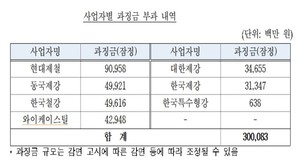
[이코노믹리뷰=이가영 기자] Seven steelmakers, including Hyundai Steel and Dongkuk Steel, which had fixed the purchase price of iron scrap (scrap metal) for eight years, were withdrawn from the Fair Trade Commission of 300 billion won. The FTC plans to decide whether to accuse them through additional deliberation.
The FTC detected a fixation on the standard price of steel scrap purchases from seven steelmakers including Hyundai Steel, Dongkuk Steel, Daehan Steel, YCase Steel, Korea Steel, Korea Steel, and Korea Special Steel, and a penalty of KRW 300 billion, including a corrective order, such as prohibiting information exchange It was announced on the 26th that it had decided to impose a policy.
Penalties for bereavement (provisional) are Hyundai Steel’s 9,985 billion won, Dongkuk Steel’s 49,921 billion won, Korea Steel’s 49.616 billion won, YK Steel’s 43,488 billion won, Daehan Steel’s 3,455 million won, Korea’s 3,373 billion won, and Korea Special Steel. It is 638 million won.
This penalty is the fourth largest ever imposed by the Fair Trade Commission and is the largest in the Moon Jae-in administration.
Iron scrap is scrap metal selected by collecting waste steel products such as by-products generated during the production and processing of steel products, waste home appliances, and waste cars. It is used as a raw material when making reinforcing bars and steel plates. The steelmaker sets a standard price for iron scrap, informs the delivery company, and purchases iron scrap by paying the price plus transportation costs.
It is difficult to flexibly increase supply in response to demand because it is collected rather than produced. The FTC explains that the competition for purchasing is fierce among steelmakers as it is a chronic excess demand market with more demand than supply. When a specific steelmaker raises the purchase price to secure an inventory of iron scrap, the quantity is concentrated on the company, making it difficult for competitors to purchase.
Accordingly, seven steelmakers agreed to the extent and timing of changes, such as raising and lowering the purchase price of iron scrap from 2010 to 2018, and implemented them. They organized meetings of working-level workers in the Yeongnam and Gyeongin areas, exchanged important information and colluded with each factory location.
The collusion took place through a meeting of the purchasing team leaders of each company and the exchange of important information between the purchasing team personnel. In particular, 7 companies refrained from meeting with the purchasing team leader after conducting an on-site investigation by the Fair Trade Commission in Busan in April 2016, and continued collusion by exchanging important information more secretly.
The seven steelmakers also thoroughly maintained security so that the fact of collusion was not exposed. The purchasing team leader of each company used pseudonyms such as’Kim Cheol-soo’,’Oh Ja-ryong’, and’Ma Dong-tak’ when booking the meeting. The meeting did not inform the company’s supervisors, and the meals were paid with cash. Writing of documents on the results of the meeting was also prohibited.
An official from the FTC said, “The deliberation is scheduled for next month, and the results of the deliberation on activities such as interfering with the investigation that occurred in the investigation process will also be announced separately.” I expect this to be activated.”
